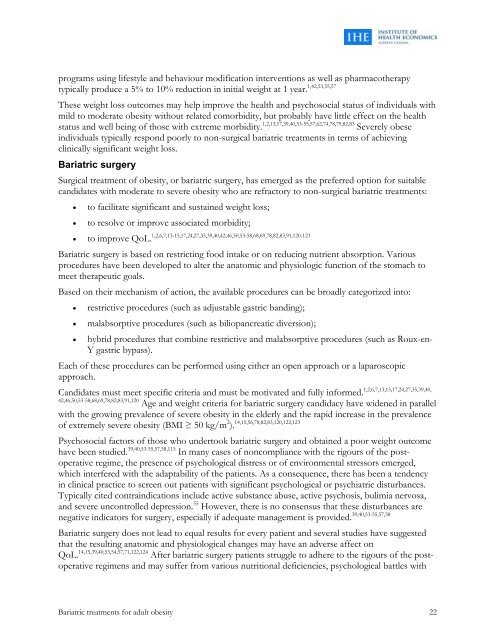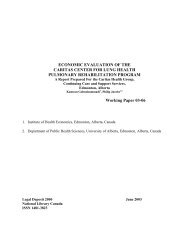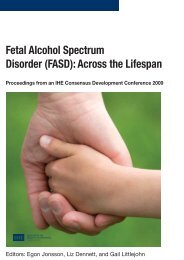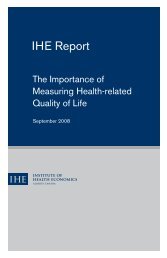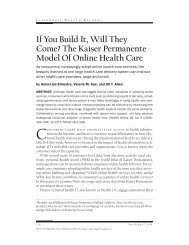programs using lifestyle and behaviour modification interventions as well as pharmacotherapytypically produce a 5% to 10% reduction in initial weight at 1 year. 1,42,53,55,57These weight loss outcomes may help improve the health and psychosocial status <strong>of</strong> individuals withmild to moderate <strong>obesity</strong> without related comorbidity, but probably have little effect on the healthstatus and well being <strong>of</strong> those with extreme morbidity. 1,2,13,17,39,40,53-55,57,62,74,78,79,82,83 Severely obeseindividuals typically respond poorly to non-surgical bariatric <strong>treatments</strong> in terms <strong>of</strong> achievingclinically significant weight loss.<strong>Bariatric</strong> surgerySurgical treatment <strong>of</strong> <strong>obesity</strong>, or bariatric surgery, has emerged as the preferred option <strong>for</strong> suitablecandidates with moderate to severe <strong>obesity</strong> who are refractory to non-surgical bariatric <strong>treatments</strong>:to facilitate significant and sustained weight loss;to resolve or improve associated morbidity; to improve QoL. 1,2,6,7,13-15,17,24,27,35,39,40,42,46,50,53-58,68,69,78,82,83,91,120-123<strong>Bariatric</strong> surgery is based on restricting food intake or on reducing nutrient absorption. Variousprocedures have been developed to alter the anatomic and physiologic function <strong>of</strong> the stomach tomeet therapeutic goals.Based on their mechanism <strong>of</strong> action, the available procedures can be broadly categorized into:restrictive procedures (such as adjustable gastric banding);malabsorptive procedures (such as biliopancreatic diversion); hybrid procedures that combine restrictive and malabsorptive procedures (such as Roux-en-Y gastric bypass).Each <strong>of</strong> these procedures can be per<strong>for</strong>med using either an open approach or a laparoscopicapproach.Candidates must meet specific criteria and must be motivated and fully in<strong>for</strong>med. 1,2,6,7,13,15,17,24,27,35,39,40,42,46,50,53-58,68,69,78,82,83,91,120Age and weight criteria <strong>for</strong> bariatric surgery candidacy have widened in parallelwith the growing prevalence <strong>of</strong> severe <strong>obesity</strong> in the elderly and the rapid increase in the prevalence<strong>of</strong> extremely severe <strong>obesity</strong> (BMI ≥ 50 kg/m 2 ). 14,15,56,78,82,83,120,122,123Psychosocial factors <strong>of</strong> those who undertook bariatric surgery and obtained a poor weight outcomehave been studied. 39,40,53-55,57,58,115 In many cases <strong>of</strong> noncompliance with the rigours <strong>of</strong> the postoperativeregime, the presence <strong>of</strong> psychological distress or <strong>of</strong> environmental stressors emerged,which interfered with the adaptability <strong>of</strong> the patients. As a consequence, there has been a tendencyin clinical practice to screen out patients with significant psychological or psychiatric disturbances.Typically cited contraindications include active substance abuse, active psychosis, bulimia nervosa,and severe uncontrolled depression. 55 However, there is no consensus that these disturbances arenegative indicators <strong>for</strong> surgery, especially if adequate management is provided. 39,40,53-55,57,58<strong>Bariatric</strong> surgery does not lead to equal results <strong>for</strong> every patient and several studies have suggestedthat the resulting anatomic and physiological changes may have an adverse affect onQoL. 14,15,39,40,53,54,57,71,122,124 After bariatric surgery patients struggle to adhere to the rigours <strong>of</strong> the postoperativeregimens and may suffer from various nutritional deficiencies, psychological battles with<strong>Bariatric</strong> <strong>treatments</strong> <strong>for</strong> <strong>adult</strong> <strong>obesity</strong> 22
food, and a negative body image. As a direct consequence <strong>of</strong> successful surgery, 30% to 40% <strong>of</strong>patients require plastic surgery (known as body contouring surgery) to remove excess skin afterweight is lost. 39,40,46,53-55,57,67Outcomes vary by surgical procedure and depend on the intrinsic value <strong>of</strong> each procedure. 14,15,17,39,40,46,53-55,57,58,69,74,82,83,120,122,125Desired outcomes depend to a great extent on:the exclusion <strong>of</strong> candidates who are at risk <strong>for</strong> post-operative complications;the candidate’s pre-operative clinical and psychological preparation; the candidate’s acceptance <strong>of</strong> long-term, if not lifelong, follow-up.Long-term success after bariatric surgery depends on the candidate being well educated about howthe procedure will promote weight loss, and on the lifestyle and behavioural changes needed on theirpart to maintain that weight loss.Several factors may influence the choice <strong>of</strong> bariatric surgery procedure, including the patient’s andthe surgeon’s preference. 1,14,15,17,46,69,73,82,83,120 The choice also depends on:patient-related factors (including age, personality, eating patterns, BMI level, previousoperations, associated morbidities, contraindications, and personal understanding andcommitment);procedure-related factors (such as reversibility/non-reversibility and associated risks andcomplications); provider-related factors (learning curve, the availability <strong>of</strong> multidisciplinary care and support,accreditation <strong>of</strong> the center, and the training, credentials, and experience <strong>of</strong> the availablesurgical, medical, psychiatric, nursing, and other healthcare personnel).The number <strong>of</strong> competing surgical procedures and their utilization has increased during the past fewdecades. Both surgeon and institutional volumes have been shown in several large-population-basedstudies to affect outcomes. 1,14,15,17,120,125-130 As a result, facility and bariatric surgeon accreditation andcredentialing standards grounded in evidence-based best practice have been developed by variousbodies, including the American College <strong>of</strong> Surgeons (ACS), the American Society <strong>for</strong> Metabolic and<strong>Bariatric</strong> Surgery (ASMBS), and others. 14,15,70,120,123,125,127,129,131-135According to best practice recommendations, effective and successful surgical programs requireappropriately accredited specialized facilities and multidisciplinary teams with experience in <strong>obesity</strong>management and surgery (including dedicated and appropriately trained and credentialed physicians,nurses, dietitians, physiotherapists, psychologists/psychiatrists, counsellors, anestheticians, andsurgeons). 1,14,15,17,46,70,82,83,120,123,129-134 Substantial pre- and post-operative evaluation <strong>of</strong> patients, teaching,and monitoring are required to optimize the outcomes. Treated patients should be followed up <strong>for</strong>at least 5 years to ensure success and appropriate support. 1,15,120 Such specialized, multidisciplinary,long-term care is considered a valid indicator <strong>of</strong> quality in bariatric surgery programs, along with thedevelopment and use <strong>of</strong> care pathways and the prospective collection <strong>of</strong> data on thesafety andefficacy <strong>of</strong> all per<strong>for</strong>med procedures. 70,123,129-134Best practice guidelines in bariatric surgery recommend the completion <strong>of</strong> <strong>for</strong>mal residency trainingin general surgery and <strong>of</strong> <strong>for</strong>mal training in open and laparoscopic approaches. 1,14,15,120,127,129-132 Toacquire the skills needed to per<strong>for</strong>m laparoscopic bariatric surgery a surgeon must negotiate arelatively steep learning curve (between 75 and 100 cases). Ideal training would include the<strong>Bariatric</strong> <strong>treatments</strong> <strong>for</strong> <strong>adult</strong> <strong>obesity</strong> 23
- Page 1 and 2: Alberta STE ReportBariatric treatme
- Page 3 and 4: Alberta STE ReportBariatric treatme
- Page 5 and 6: EXECUTIVE SUMMARYSocial and System
- Page 7 and 8: Three surgical procedures—adjusta
- Page 9: Costs of Bariatric Surgery and Pote
- Page 12 and 13: Regulatory status .................
- Page 14 and 15: TABLES AND FIGURESSection One: Soci
- Page 16 and 17: ABBREVIATIONSAll abbreviations that
- Page 18 and 19: LYMmMAMDMUHCNANHLBINHSNICENIHNNHNPH
- Page 20 and 21: Bariatric physician: a licensed Doc
- Page 22 and 23: High-density lipoprotein (HDL): a f
- Page 24 and 25: Very-low-calorie diet (VLCD): a die
- Page 26 and 27: Additional Internet searches were c
- Page 28 and 29: This report addresses obesity in ad
- Page 30 and 31: Many systemic factors have been ide
- Page 32 and 33: Severe obesity is associated with d
- Page 34 and 35: eport their height and under-report
- Page 36 and 37: Also using self-reported data from
- Page 38 and 39: An examination of overall obesity d
- Page 40 and 41: Table S.2 presents the associationa
- Page 42 and 43: • have multiple focal points and
- Page 45: The main problem in any weight mana
- Page 50 and 51: directly causes death. 61 To the ex
- Page 52 and 53: The addition of a selected pharmaco
- Page 54 and 55: lack of formal training in nutritio
- Page 56 and 57: slightly more likely to have prescr
- Page 58 and 59: selection criteria, have facilities
- Page 60 and 61: Barriers to using appropriate baria
- Page 62 and 63: Overview of adult obesityOver the p
- Page 64 and 65: the need for regular physical activ
- Page 66 and 67: phenylpropanolamine/25. Sibutramine
- Page 68 and 69: Complianceand AdherenceDemand andut
- Page 70 and 71: Aetna Clinical PolicyBulletinswww.a
- Page 72 and 73: Overweight 123,821 172,971 157,623
- Page 74 and 75: REFERENCES1. 2006 Canadian clinical
- Page 76 and 77: 34. Gostin LO. Fast and supersized:
- Page 78 and 79: 69. Klarenbach S, Padwal R, Wiebe N
- Page 80 and 81: 105. Hill JO, Thompson H, Wyatt H.
- Page 82 and 83: 141. Ross R, Bradshaw AJ. The futur
- Page 84 and 85: 172. Arkinson J, Ji H, Fallah S, Pe
- Page 86 and 87: This section will address a set of
- Page 88 and 89: dietary therapy is to reduce total
- Page 90 and 91: Additional benefits of exercise ove
- Page 92 and 93: medications that inhibit intestinal
- Page 94 and 95: Rimonabant may be considered for pa
- Page 96 and 97:
Long-term complications are specifi
- Page 98 and 99:
Devices used for bariatric surgeryH
- Page 100 and 101:
Description of the Included Systema
- Page 102 and 103:
AEs for sibutramineAs compared to a
- Page 104 and 105:
Evidence on Efficacy/EffectivenessW
- Page 106 and 107:
Table T.7: Effects of behavioural t
- Page 108 and 109:
SurgeryDescription of the included
- Page 110 and 111:
follow-up time was 3 years. Results
- Page 112 and 113:
group as compared to the VBG group.
- Page 114 and 115:
The authors identified many methodo
- Page 116 and 117:
The investigators pointed out that
- Page 118 and 119:
approximately 3 to 5 kilograms. For
- Page 120 and 121:
for studies with a mean age of part
- Page 122 and 123:
Examining whether use of any of the
- Page 124 and 125:
Evidence from placebo-controlled cl
- Page 126 and 127:
colorectal or gastroesophageal or f
- Page 128 and 129:
Web of ScienceISI Interface License
- Page 130 and 131:
AMA Clinical PracticeGuidelineswww.
- Page 132 and 133:
critical appraisal of the included
- Page 134 and 135:
APPENDIX T.B: EXCLUDED STUDIESTable
- Page 136 and 137:
Padwal R, Li SK, Lau DC. Long-term
- Page 138 and 139:
Quality subsection 1: At least MEDL
- Page 140 and 141:
Quality subsection 5a:Study quality
- Page 142 and 143:
Partially reported: The study types
- Page 144 and 145:
Table T.C.1: Results of quality ass
- Page 146 and 147:
Table T.C.1: Results of quality ass
- Page 148 and 149:
APPENDIX T.D: CHARACTERISTICS OF SY
- Page 150 and 151:
Table T.D.1: Characteristics of the
- Page 152 and 153:
Table T.D.1: Characteristics of the
- Page 154 and 155:
Table T.D.2: Characteristics of the
- Page 156 and 157:
APPENDIX T.E: EVIDENCE TABLE ON SAF
- Page 158 and 159:
Serious surgical complicationsSurgi
- Page 160 and 161:
LSGmMAMDNAnssORQoLRCTRDRRRYGBSBPTGV
- Page 162 and 163:
Table T.F.1-2: Weight loss - Behavi
- Page 164 and 165:
Table T.F.1-4: Weight loss - Surger
- Page 166 and 167:
Table T.F.2: Quality of life (QoL)
- Page 168 and 169:
Curioni & Lourenco 2005 58Cholester
- Page 170 and 171:
Table T.F.3-3: Risk factors/comorbi
- Page 172 and 173:
Table T.F.3-5: Long-term effects of
- Page 174 and 175:
Maciejewski et al., 2005 65Avenell
- Page 176 and 177:
Table T.G.2: Effects of bariatric s
- Page 178 and 179:
Table T.G.4: Effects of bariatric s
- Page 180 and 181:
18. Cerulli J, Lomaestro BM, Malone
- Page 182 and 183:
50. Health Canada Drug Product Data
- Page 184 and 185:
SECTION THREE: ECONOMIC EVALUATIONC
- Page 186 and 187:
Definition of bariatric surgical pa
- Page 188 and 189:
etween surgical interventions, the
- Page 190 and 191:
concluded that adding orlistat to L
- Page 192 and 193:
Weight management program (WMP) ver
- Page 194 and 195:
groups. Compared with standard care
- Page 196 and 197:
Results from Analysis of Provincial
- Page 198 and 199:
DiscussionThe objectives of the eco
- Page 200 and 201:
surgical suites, and so on. The bud
- Page 202 and 203:
APPENDIX E.A: LITERATURE SEARCH SUM
- Page 204 and 205:
CRD Databases(DARE, HTA & NHS EED)h
- Page 206 and 207:
Web of ScienceISI Interface License
- Page 208 and 209:
NEOS Librarywww.library.ualberta.ca
- Page 210 and 211:
Table E.A.2: Evidence table of revi
- Page 212 and 213:
ResultHealth outcomesCostsMarginal
- Page 214 and 215:
CostsMarginal analysisThe cost anal
- Page 216 and 217:
Time Horizon/discount rateCurrency/
- Page 218 and 219:
Objectivestudy perspective: society
- Page 220 and 221:
ResultHealth outcomesCostsMarginal
- Page 222 and 223:
ResultHealth outcomesCostsMarginal
- Page 224 and 225:
S4Economic burden of obesityMean co
- Page 226 and 227:
15. Lacey LA, Wolf A, O'shea D, Ern
- Page 228 and 229:
Author Contribution StatementsPaula


